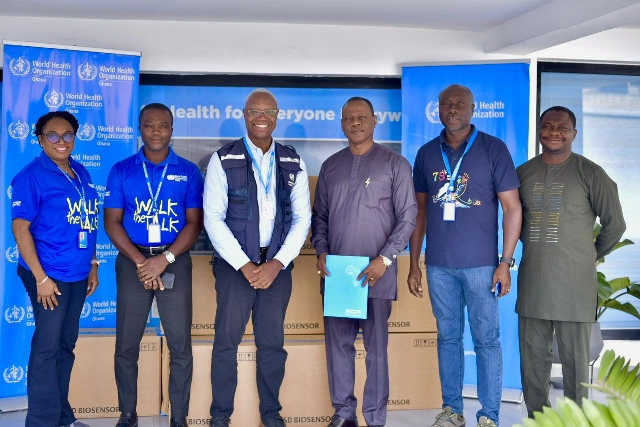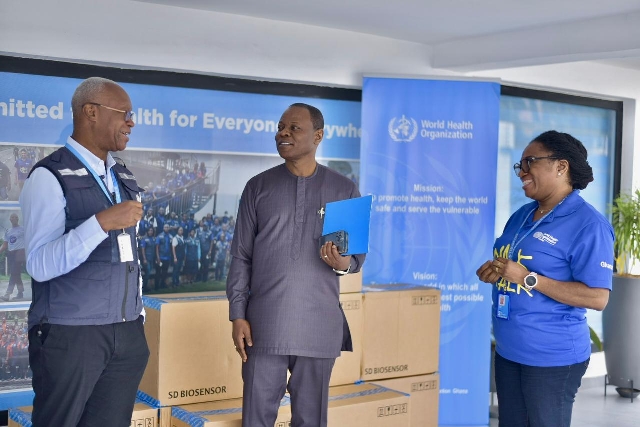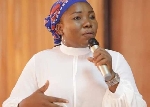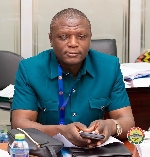Dengue fever: WHO supports Ghana with 4,000 RDTs
 WHO supports Ghana’s response to the Dengue fever outbreak providing 4,000 rapid diagnostic test (RDT) kits
WHO supports Ghana’s response to the Dengue fever outbreak providing 4,000 rapid diagnostic test (RDT) kits
The World Health Organisation (WHO) has supported Ghana’s response to the Dengue fever outbreak by providing 4,000 (rapid diagnostic test) kits.
This assistance is aimed at enhancing Ghana’s efforts in timeously identifying more cases of Dengue.
Dengue has been detected in eight out of 16 regions so far. The Ghana Health Service (GHS) reports there has been no surge in cases. Director of Public Health at the GHS, Dr Franklyn Asiedu-Bekoe, noted there have been no new cases in the past two weeks, indicating that the threat level is currently low.
So far, the number of recorded cases remains below 200 across the eight regions, with Eastern and Central regions having the highest case counts. Dr Asiedu-Bekoe emphasised Dengue was endemic, meaning cases are likely to occur throughout the country. This highlights the importance of increased testing at health facilities.
"Dengue is not unknown in the country, so the issue had to do with whether we’re testing for it [or not]. So, though we are not having any surge in cases, we will be getting some one or two cases. As you progress, it will become quite clear that reasonably, possibly, then it could be endemic in the country. What we have done is that now we have a number of testing facilities, the reference lab and Noguchi," Dr Asiedu-Bekoe said.

"The ability to confirm cases is now on the increase. We have increased our surveillance system. What I can say is that we are not having a surge in cases. You see this burden is somewhat dependent on the kind of cellular system that you use.
"Now we can do more of the testing and we are testing every malaria case. DG had received some package from the public, about 4000 kits of army. 1000 kits of RMIT that are going to be distributed. So, if you're a clinician and you see a case similar to Dengue you can test, basically,” he said.
The viral infection, transmitted by Aedes aegypti (yellow fever) mosquitoes, is gradually spreading sporadically across Ghana. All reported cases have been mild, with only two requiring hospital admission.
Although discussions are ongoing about the potential for vaccines, the Ghana Health Service remains focused on early detection, as the country needs to establish a clear threshold for vaccine use.
"We need to establish clear thresholds to say that it’s above this level and [has] become a big issue... So, I wouldn’t [ask for vaccination]. I’m not saying that it’s clearly an issue of being really endemic. What I’m saying is that you’re more likely to get cases daily across the country if you look for it," Dr Asiedu-Bekoe noted.
"So, what you’re looking for is, 'Is there a surge in cases?' And then you’ll try and make sure that you intervene. But then what is good is that the directions to address malaria, somehow addresses Dengue. So, the more effective you are with malaria, the more you also will be addressing the issue,” he highlighted.
Trending News

Increase betting tax to 50% to protect youth: ICS to President-elect Mahama
17:06
All ongoing recruitments captured in 2024 budget; no new warrant has been issued since December 7 polls - Information Minister
06:23
Ghanaians have delivered verdicts on Majority and Minority; NPP knows its real size in Parliament – Ato Forson
13:57
ORAL Is not a witch-hunting committee – Mahama
15:59
Kweku Azar petitions Akufo-Addo to remove Chief Justice Gertrude Torkornoo
06:53
Mahama to establish National Day of Prayer
12:22
#2024 Polls: EC nullifies Parliamentary results for Dome Kwabenya, 2 others
16:48
#2024Polls: NDC determined to retain seats won from NPP – Kofi Adams
01:43
GBC turned down my appointment for speaking fast – Joyce Bawah
04:02
Support us in carrying out our mandate – EC to citizens
15:31



